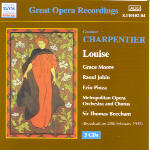Gustave Charpentier’s Louise was the French answer to the emergence of Italian verismo opera in the 1890s. Its four acts encompass a vivid soundscape of lower-class Paris in the late 19th century, which in turn provides the backdrop for the opera’s central domestic conflict. While Louise’s musical style may sound either faded or strained to contemporary listeners, the opera’s charms have the potential to win you over.
But you need the right conductor, plus singers who can deliver the proverbial goods. From the first measures of this 1943 Metropolitan Opera broadcast, you know you’re in good hands. Grace Moore brings youthful excitement and agility to the title role, except, believe it or not, for a tentative, short-of-breath “Depuis le Jour”. As Louise’s paramour Julien, Raoul Jobin’s secure, clarion vocalism (where and when does this guy take breaths?) is a wonder to behold. Casting a voice and a half like Ezio Pinza’s in the rather slight role of the father is like hiring a limo to carry you to the K-Mart. But, boy, his French is better than many native singers. The mother is Doris Doe, a Met regular whose rich, dark timbre suits her character’s meddling, control-freak qualities. Thomas Beecham conducts with infectuous vitality and stylish assurance, and the sound, though basically tinny, is quite listenable for a broadcast of this vintage.
About 20 minutes worth of music is cut: thank goodness! For updated sound and all-around idiomatic flair, try to locate the 1956 mono Opera-Comique version with Jean Fournet conducting (Philips). If stereo matters, you might opt for the protagonists of Cotrubas and Domingo in Georges Prêtre’s 1991 recording (Sony), and save Sills/Rudel (EMI) as your last resort. All told, the Beecham Louise ranks high in the annals of Met broadcasts. A lovely selection of Grace Moore’s song and aria 78s fills out the third disc.
































